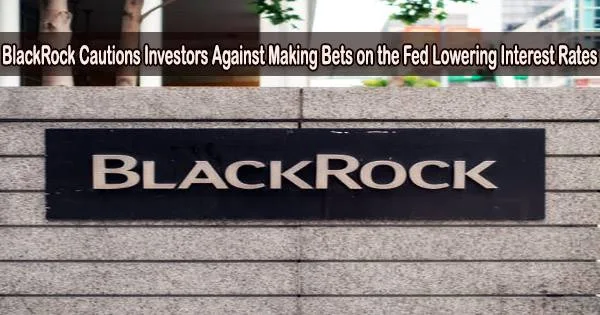According to Wall Street firms BlackRock and others, investors are overconfident that the Federal Reserve will lower interest rates this year and could pay a price later.
According to CME Group calculations, market pricing as of Tuesday (March 28, 2023) morning indicated that the Fed will keep its benchmark interest rate at its present levels and then start to cut it as early as July. By the end of the year, such reductions may amount to a full percentage point, according to the firm’s FedWatch indicator.
This is in spite of several public remarks from central bank officials, who said in their unofficial “dot plot” projection last week that they expect at least one more quarter-point increase and then no reductions until the end of 2023.
Cuts would be expected if there were a recession and an associated decline in inflation, both of which Wall Street strategists believe to be speculative.
“We don’t see rate cuts this year that’s the old playbook when central banks would rush to rescue the economy as recession hit,” BlackRock said in its weekly client note. “Now they’re causing the recession to fight sticky inflation and that makes rate cuts unlikely, in our view.”
The investing implications are ominous: BlackRock, which manages about $10 trillion in client money, says it is underweight stocks in developed markets such as the U.S. Instead, it recommends clients focus on investments like fixed income that is indexed to inflation, as well as very short-duration government bonds.
Financial stability concerns are likely to remain at least somewhat elevated over the next few months. That means a more cautious Fed and markets pricing a higher probability of more dovish policy outcomes. But to the extent financial sector risks do not materialize, focus will gradually shift back to inflation.
Economist Andrew Hollenhorst
The firm claimed that markets are still holding onto the optimism that the Fed will start to ease after a year of tightening that caused the benchmark federal funds rate to increase by 4.75 percentage points. This is the main reason why stocks have been resilient.
“We think the Fed could only deliver the rate cuts priced in by markets if a more serious credit crunch took hold and caused an even deeper recession than we expect,” BlackRock strategists wrote.
A slowing economy with high inflation
Projections the Fed released following its latest rate hike last Wednesday imply a shallow recession for later this year.
The median expectation for gross domestic product growth for the full year is 0.4%. Considering that the first quarter gain is tracking, according to an Atlanta Fed gauge, at 3.2%, the math would require at least some negative growth the rest of the way to get to the 0.4% estimate.
At the same time, officials estimate a 4.5% unemployment rate by the end of the year, from the current 3.6%. Getting there would require a loss of more than 571,000 jobs, according to an Atlanta Fed calculator.
Though that would be challenging, the Fed is likely to prioritize its inflation fight, particularly if the data continue to indicate elevated prices, Citigroup economist Andrew Hollenhorst wrote.
“Financial stability concerns are likely to remain at least somewhat elevated over the next few months. That means a more cautious Fed and markets pricing a higher probability of more dovish policy outcomes,” Hollenhorst said. “But to the extent financial sector risks do not materialize, focus will gradually shift back to inflation.”
Bank of America analysts note the paradox of investors simultaneously pricing in a Fed that will relax policy to fight an economic slowdown while also betting that stocks will continue to climb.
“The major US equity indices seem to be looking past the type of shock or economic slowdown that would get the Fed to cut rates, and yet are trading on expectations of a lower (eventually) discount factor,” BofA said.
“This is despite two important facts: (i) recessions are reliably negative for equities throughout history and not discounted in advance, and (ii) the FOMC projections and dots imply no rate cuts even if we get a mild recession this year.”
Like BlackRock, Bank of America is advising clients to bet against U.S. stocks and instead focus on strategies that pay when the market falls.















